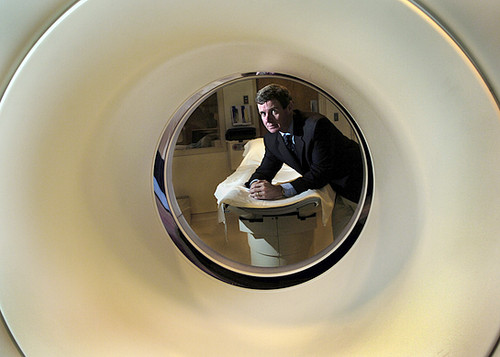
Read the story online at http://www.courant.com/news/health/hc-luckydoc.artsep10,0,7572510.story?coll=hc_features_promo
I personally hate these stories, the ones that turn heart scans into drama by describing how someone had a heart scan, then turned out to have so much coronary plaque that they had to have bypass surgery.
But I point this one out because the story is related in an interesting way. It highlights the utter ignorance that operates in heart disease detection.
The story highlights how a 50-year-old, 5 ft 8, 150 lb slender, exercising neurologist underwent a CT coronary angiogram in a newly installed device in a Hartford, Connecticut hospital (not a heart scan) that detected entirely unsuspected severe and diffuse coronary disease. You know the rest: abnormal stress test, heart catheterization, bypass surgery of the hapless doctor-now-patient, followed by grateful patient saying things like "This machine saved my life."
It probably is true. You've seen these stories before. I've witnessed these sorts of headline-makers for the past decade. I remain surprised that it still happens.
The doctor is not some ignorant, uninformed man who can't even fill out his income tax forms. Yet how does a man like this walk around with life-threatening disease and not know it? Why does it still make headlines?
Anyway, despite all my jawing about heart scans and early heart disease detection, many physicians and the public remain in the stone age of heart disease. Even though this neurologist's story made headlines, the many other people who 1) identified their heart disease earlier with a simple heart scan, then 2) took action to put a stop to it, do not make headlines. But that's the way to go.
Why isn't the rest of the story being told? Why was this man's heart disease uncovered only in its late phases? Hartford, Connecticut is not some backwater. I've been there. It's a major city with large hospitals and a University Medical Center. But a professional with presumed knowledge of health and his doctor(s) allowed this to happen?
In other words, this is not a story of success, but of failure --failure to identify coronary disease years earlier when preventive action would have prevented bypass. But that's not such a compelling headline, is it?
As an aside, I'll bet you that this man has lipoprotein(a), a severe small LDL pattern, and severe deficiency of vitamin D. Correct these and it's unlikely he'll need bypass again. But that's kind of boring, isn't it?